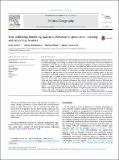Post-trafficking bordering practices : perverse co-production, marking and stretching borders
Abstract
This paper highlights the significance of post-trafficking scenarios for understanding bordering practices in political geography. In so doing, it addresses two significant research gaps: the lack of attention to trafficking in geography and the failure of wider interdisciplinary debates to engage with post-trafficking specifically. While extensive research in political geography has addressed the related experiences of refugees, asylum seekers and 'illegals', much of this work has centred on policies, processes and practices that aim to keep 'unwanted strangers out'. By contrast, very little research has addressed how the border is configured for and by those who are crossing-back over; those who are 'returning home', in this case from diverse trafficking situations. The paper draws on recent empirical research on post-trafficking citizenship and livelihoods in Nepal which examined how women returning from trafficking situations deal with stigma and marginalisation. Our analysis illuminates how bordering practices circumscribe and shape women's lives in powerful ways as they seek to (re)establish a sense of belonging and respect. We examine the interplay of state and non-state actors (national and transnational) in structuring mobility and anti-trafficking advocacy through a range of bordering practices and explore how the border is (co-)produced by varied actors at different border sites. This includes women returning from diverse trafficking situations, who invoke the border to argue that they are 'not as trafficked' as other women, and others who perform the border differently as agents for trafficking prevention.
Citation
Laurie , N , Richardson , D , Poudel , M & Townsend , J 2015 , ' Post-trafficking bordering practices : perverse co-production, marking and stretching borders ' , Political Geography , vol. 48 , pp. 83-92 . https://doi.org/10.1016/j.polgeo.2015.06.001
Publication
Political Geography
Status
Peer reviewed
ISSN
0962-6298Type
Journal article
Description
The research for this paper was funded by the Economic and Social Research Council – ESRC Res-062-23-1490: ‘Post Trafficking in Nepal: Sexuality and Citizenship in Livelihood Strategies’.Collections
Items in the St Andrews Research Repository are protected by copyright, with all rights reserved, unless otherwise indicated.

